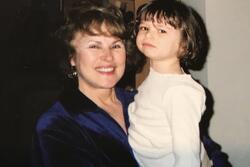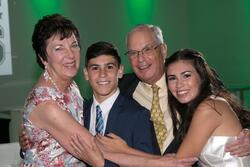Stories from My Bubbe
Every time she speaks, it’s as if my grandmother, my bubbe, is delivering an address. My bubbe is the type to stop and talk to every single person she passes on the street, and she makes all of them feel important. What's her secret? Well, after nearly eighty years of life, she tells me knowingly, “I love that I am always learning.”
My bubbe is the most glamorous person I know. She has drawers full of makeup, a closet lined with fancy clothes and jewelry boxes dripping with golden rings and necklaces. She smoothes on her pink lipstick as if every day she is preparing for a gala. Before I had my own, she’d let me wear a dab of her makeup, and I would prance around with rosy cheeks like I was her little Barbie doll.
Glamour and strength are not, and never have been, mutually exclusive. She’s kept her big blond hair all of these years and has always had gorgeous, long nails, usually painted red; she also raised two caring, intelligent boys. While she was a stay-at-home mother, a feat itself, she went back to college and got her degree. She became a Bat Mitzvah as an adult because women typically weren’t permitted to become Bat Mitzvahs in her community, and her family couldn’t afford a ceremony when she was younger. Her entire life, she has held her beliefs close to her heart and has always found a way to embody everything for which she stands.
Her words might be my favorite part about spending time with her. “It took me ten years to learn to stand up for myself,” my bubbe told me recently about her transition from her twenties to her thirties.
Once, following a family dinner, she told me, “There’s nothing wrong with being shy. I was very shy growing up.” Her affirmation was a sigh of relief for me.
Another time, after I told her about boy troubles, she knowingly said, “Oh, don’t worry. You’ll date lots of boys.” It must be silly for her to hear about my teenage problems after all she’s experienced, but she has never dismissed me or made me feel stupid.
The best quality about her to me is her open mind. It is so easy for the older generations to ignore those younger than them, but she always listens. “I’m never trying to change your mind,” she told me after we talked about political issues. She is respectful and supportive of those that come after her. Although my bubbe doesn’t consider herself religious, she is a devoted member of her synagogue; she attends every service, and has served as a longtime member of the board. Why?
“I am not observant, but it’s important that the synagogue is here for our children and everyone who needs it.”
To me, that is Judaism. Arevim zeh bazeh: we are all responsible for one another.
I’ve heard a lot of stories over the years about Bubbe’s childhood. She was raised mostly by a single mom with two older sisters. They moved from New York City to Miami when she was a little girl, and she’s stayed near ever since. She was quiet and kept to herself like me, spending most of her free time immersed in books.
The stories about her and my grandfather are some of my favorites. Our whole family always laughs recalling the time when they were dating, and she slapped him across the face when he made a pass at her. Although it's just an anecdote, it encapsulates her pretty well. And my grandfather didn’t leave things to chance; they got married six weeks after they met.
She was born in the midst of World War II, witnessed the Civil Rights Movement, Vietnam, 9/11, countless other tumultuous events, and now the Coronavirus pandemic. Above all, she is a testament to the strength of women, mothers, and Jews. As Jewish women, we are undeniable and we are powerful. Anyone with their own bubbe can attest to this, and to mine, I say thank you for the hand you’ve had in creating a life full of grace and strength for me. Bubbes represent what we all hope to be. Really, all that there is to say is "thank God for bubbes."
This piece was written as part of JWA’s Rising Voices Fellowship.





